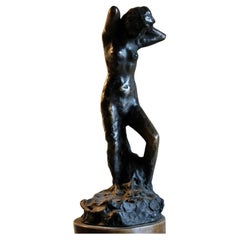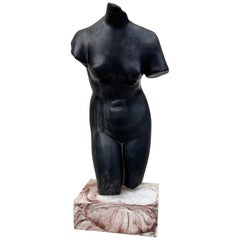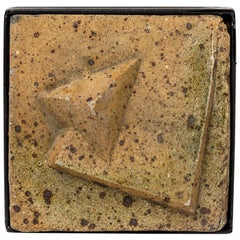Pierre Bonnard Figurative Sculptures
French, 1867-1947
Pierre Bonnard was a French painter, illustrator and printmaker, born in 1867. He is known especially for the stylized decorative qualities of his paintings and his bold use of color. He painted landscapes, urban scenes, portraits and intimate domestic scenes, where the backgrounds, colors and painting style usually took precedence over the subject. He was a founding member of the post-impressionist group of avant garde painters, Les Nabis. He was also a leading figure in the transition from impressionism to modernism.
to
1
1
1
1
1
1
1
1
Height
to
Width
to
1
1
1
43
154
151
143
112
Creator: Pierre Bonnard
Pierre Bonnard 'Femme Nue Debout Bras Leves Derriere La Tete..' Alva Repro
By Pierre Bonnard
Located in Sharon, CT
Cast from the original "Femme Nue Debout Bras Leves Derriere La Tete, S'epongeant La Nuque" Bronze in The Albright Art Gallery. Published by Alva Reproductions. A rare reproduction ...
Category
Mid-20th Century American Modern Pierre Bonnard Figurative Sculptures
Materials
Plaster
Related Items
Vintage ALVA Studios Cast Stone Aphrodite Sculpture in Black
By Alva Studios
Located in San Carlos, CA
FOR SALE: Stunning ALVA Studios Cast Stone Aphrodite Sculpture in Black
Enhance your space with this elegant cast stone sculpture by ALVA Studios, depicting Aphrodite in striking bl...
Category
1960s American Neoclassical Vintage Pierre Bonnard Figurative Sculptures
Materials
Cast Stone
Abstract Brown Wall Ceramic Sculpture by Pierre Digan La Borne
By Pierre Digan
Located in Neuilly-en- sancerre, FR
Pierre Digan (1941-2016),
20th midcentury ceramic wall sculpture by Pierre Digan
Realized, circa 1960 in La Borne
Original brown ceramic color
In a black metal frame
M...
Category
20th Century French Mid-Century Modern Pierre Bonnard Figurative Sculptures
Materials
Ceramic
Mid-century vintage Alva Studios classical Greco-Roman bust
By Alva Museum Replicas, Inc.
Located in Allentown, PA
This is a mid-century vintage classical Greco-Roman bust. This classical bust has an antique finish to the surface of the plaster and stands on a black plinth. The bust is signed Alv...
Category
1990s American Greco Roman Pierre Bonnard Figurative Sculptures
Materials
Plaster
Set of 4 Alva Museum Reproductions of Ancient Egyptian Busts
By Alva Museum Replicas, Inc.
Located in Hopewell, NJ
Set of 4 busts from the Boston Museum Alva Reproductions that are fascinating reproductions of ancient Egyptian busts. Make beautiful accessories on tabletops or bookshelves.
Small...
Category
1970s American Egyptian Vintage Pierre Bonnard Figurative Sculptures
Materials
Plaster, Wood
Alva Studios Venus de Milo sculpture, 1955 mid-century
By Alva Studios
Located in San Francisco, US
A lovely freestanding sculpture of Venus de Milo by Alva Studios, circa 1955. Made from composite. The statue rests upon a wooden base.
In Roman mythology, Venus was the goddess of ...
Category
20th Century North American Classical Greek Pierre Bonnard Figurative Sculptures
Materials
Ceramic, Hardwood
Faunesse Debout (Standing Faunesse), after Auguste Rodin
By Auguste Rodin
Located in West Palm Beach, FL
Faunesse Debout (Standing Faunesse), after Auguste Rodin
François Auguste René Rodin (1840–1917)
Faunesse Debout (Standing Faunesse), Simple Rock Version, the original received in...
Category
20th Century French Modern Pierre Bonnard Figurative Sculptures
Materials
Marble, Bronze
Leda Armchair, Sculpture Inspired by Salvador Dali “Femme á la téte rose” 1935
By BD Barcelona Design, Salvador Dalí
Located in Brooklyn, NY
Taken from “Femme á la téte rose,” 1935 (Woman with a head of roses). It was sufficient for this sculpture to be made as a three dimensional piece...
Category
21st Century and Contemporary Spanish Pierre Bonnard Figurative Sculptures
Materials
Brass
$49,605 / item
H 36.23 in W 23.63 in D 18.51 in
1991 Male Torso Sculpture Sergey Eylanbekov Alva Studios
Located in Chula Vista, CA
1991 Plaster Male Torso Sculpture Sergey Eylanbekov
Plaster Sculpture by Russian sculptor Sergey Eylanbekov for ALVA studios.
15.25 h x 8.75 w x 4.38 d
Signed on verso. No COA is av...
Category
1990s European Modern Pierre Bonnard Figurative Sculptures
Materials
Plaster
Sculpture Entitled "La Citadelle" by Pierre Martinon, circa 2000
By Pierre Martinon
Located in Saint-Ouen, FR
Ceramic sculpture entitled « La Citadelle » by Pierre Martinon.
Perfect original conditions.
Signed and dated at the base "Pierre Martinon 2000".
Unique piece.
Far from...
Category
21st Century and Contemporary French Beaux Arts Pierre Bonnard Figurative Sculptures
Materials
Ceramic
$17,884
H 27.17 in W 18.12 in D 15.75 in
19th Century Animalier French Bronze Entitled "Taureau Debout" by Rosa Bonheur
By Rosa Bonheur
Located in London, GB
"Taureau Debout" by Rosa Bonheur.
An excellent late 19th Century French animalier bronze study of a standing bull with fine hand chased surface that accentuates the muscle definition of the subject, signed Rosa B.
ADDITIONAL INFORMATION
Measures: Width: 32 cm
Height: 18 cm
Depth: 11cm
Condition: Excellent Original Condition
Circa: 1870
Materials: Bronze
Book reference: Animals in Bronze by Christopher Payne
Page no. 174
DESCRIPTION
Bonheur, Rosa (1822-1899)
The most popular artist of nineteenth-century France, Rosa Bonheur was also one of the first renowned painters of animals and the first woman awarded the Grand Cross by the French Legion of Honor. A professional artist with a successful career, Bonheur lived in two consecutive committed relationships with women.
Born on March 16, 1822 in Bordeaux, Marie Rosalie Bonheur was the oldest of the four children of Raimond Oscar Bonheur (1796-1849) and Sophie Marquis. Bonheur's father was an art teacher who came from a poor family, while her mother, a musician, had descended from a middle-class family and had been her husband's art student.
Bonheur's father, who taught drawing and landscape painting, was an ardent member of the utopian Saint Simeon society.
The group held idealistic beliefs about the reform of work, property, marriage, and the role of women in society. Most importantly, for the artist's future, the Saint Simeons questioned traditional gender norms and firmly believed in the equality of women. While teaching artistic techniques to his oldest daughter, Raimond Bonheur also encouraged her independence and taught her to consider art as a career.
In 1828 Raimond Bonheur joined the Saint Simeons at their retreat outside Paris. Sophie and the children joined him in Paris the following year. Four years later, however, Raimond abandoned his family to live in isolation with his fellow Saint Simeons.
Sophie Bonheur died in 1833 at the age of thirty-six. Rosa was only eleven years old when her mother died, but she was aware of the heavy price her mother paid for married life with a man who was more dedicated to his own ideals than to meeting his family's needs. Rosa also saw that her mother's marriage led to poverty and her death from exhaustion.
After her mother's death, Bonheur was taken in by the Micas family who resided nearby. Mme Micas and Bonheur's mother had been friends. When Mme Bonheur died, the Micas family paid Raimond Bonheur's debts and cared for Rosa. Their daughther, Nathalie, who would later become an amateur inventor and unschooled veterinarian, and Rosa became enamored with each other.
When Rosa Bonheur began her career as a professional artist, she had already been trained by her father who had allowed her to study in all male classes. Rosa also learned by sketching masterworks at the Louvre from the age of fourteen, and later, by studying with Léon Cogniet.
From the very beginning, Bonheur's favorite subject was animals. She learned their anatomy completely by dissecting them in local slaughterhouses. She also visited the horse market two times a week. Study of animals by direct observation led to the formation of the realist style in which Bonheur worked.
It was for such work that Bonheur obtained written permission from the French government to wear men's slacks. Her working attire also consisted of a loose smock and heavy boots that protected her feet from the dangerous environment in which she painted. The style of dress that the artist adopted for work and home may well have been influenced by her father's attire, which was based on St. Simeonian clothing experiments. Bonheur also cropped her hair, perhaps to facilitate her work. She did, however, always wear dresses for social occasions because she knew that appropriate dress would further her career.
Bonheur earned a successful living as a painter of animals. She exhibited at the annual Paris Salon regularly from the age of nineteen in 1841 through 1853, when she was thirty-one. She won the salon's gold medal at the age of twenty-six in 1848 and was commissioned by the French government to paint Plowing on the Nivernais in 1849. In the same year Bonheur and her sister Juliette became directors of l'École gratuite de dessin pour les jeunes filles, a post their father had once held.
Bonheur completed her most renowned work, The Horse Fair, in 1855. The successful representation of percherons (a breed native to Normandy) was purchased by Ernest Gambart, a London art dealer whose gallery specialized in work by French artists. He exhibited The Horse Fair in London where Bonheur visited with Nathalie. Queen Victoria requested a private viewing of the painting at Windsor Castle. It would later be purchased in 1887 by Cornelius Vanderbilt and donated to the new Metropolitan Museum of Art in New York City.
Bonheur's trip to England allowed her to meet Charles Eastlake, then President of the Royal Academy, John Ruskin, the English writer and critic, and Edwin Landseer, the British animalier. She also toured the English and Scottish countrysides and executed some paintings based on her observations of new breeds of animals found there.
Gambart made engravings of Bonheur's work, including The Horse Fair, and sold them in England, Europe, and the United States. Bonheur became one of the most renowned painters of the time. Little girls, such as Anna Klumpke in the United States, even had dolls in her likeness, much as American girls played with Shirley Temple dolls...
Category
19th Century French Art Nouveau Antique Pierre Bonnard Figurative Sculptures
Materials
Bronze
$6,883
H 7.09 in W 13 in D 4.34 in
Pablo Picasso, Grosse tête, profil gauche, 1965, Editon Picasso, Madoura
By Pablo Picasso, Madoura
Located in Nice, Cote d' Azur
Pablo Picasso
Grosse tête, profil gauche,
1965,
Sculpture en terre
H. 28 cm, Larg. 9,5 cm
R.A Coulage à la barbotine
Blanc
Tiré à 50 exemplaires numérotés
R.747 à gauche
Editon Pi...
Category
1960s French Modern Vintage Pierre Bonnard Figurative Sculptures
Materials
Earthenware
$41,729
H 11.23 in Dm 3.75 in
Femme Hermes Bronze Sculpture
Located in Houston, TX
A contemporary post modern patinated bronze "Femme Hermes" sculpture, unsigned.
Category
20th Century North American Post-Modern Pierre Bonnard Figurative Sculptures
Materials
Bronze
Pierre Bonnard figurative sculptures for sale on 1stDibs.
Pierre Bonnard figurative sculptures are available for sale on 1stDibs. These distinctive items are frequently made of plaster and are designed with extraordinary care. There are many options to choose from in our collection of Pierre Bonnard figurative sculptures, although black editions of this piece are particularly popular. Many of the original figurative sculptures by Pierre Bonnard were created in the modern style in united states during the mid-20th century. If you’re looking for additional options, many customers also consider figurative sculptures by Richard A. Hirsch, KAWS, and Frederick Hart. Prices for Pierre Bonnard figurative sculptures can differ depending upon size, time period and other attributes — on 1stDibs, these items begin at $750 and can go as high as $750, while a piece like these, on average, fetch $750.
Creators Similar to Pierre Bonnard
Questions About Pierre Bonnard Figurative Sculptures
- How did Pierre Bonnard paint?1 Answer1stDibs ExpertApril 5, 2022Pierre Bonnard was a post-impressionist whose work is known for his bold use of color and stylized qualities. Bonnard would often work on multiple paintings at once, tacking rolls of canvas to a wall and cutting them once the painting was complete. Browse a collection of Pierre Bonnard paintings and prints on 1stDibs.


